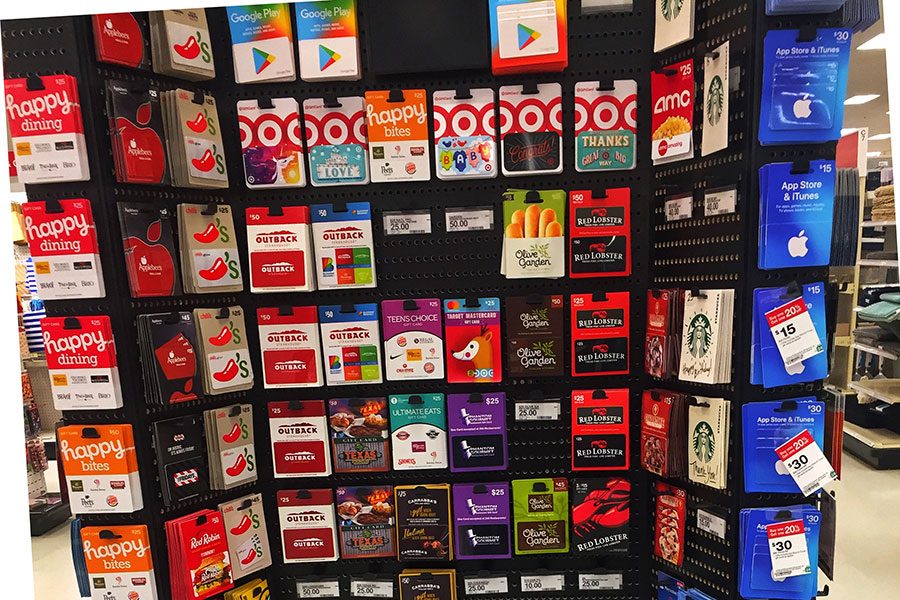A Christmas dilemma
Gift cards are increasingly popular among US consumers, as demonstrated by this large selection. Unfortunately, gift cards can be an inefficient vehicle for an exchange of value.
December 20, 2018
It’s Christmas morning, the family rushes to the Christmas tree, staring at the mountain of parsels. First, you open a strange craft kit, then a shirt two sizes too large, then, finally, a heavier package, a bit lumpy — raisins. Feeling a bit discouraged, you begin to open a card — no one can mess that up. You crack it open, and out comes a giftcard to Chili’s. What are you going to do with this? Certainly not use it.
The frustrating element of holiday giving is that the desires of a an individual and the gifts they receive may differ significantly. Unfortunately, this leaves both giver and receiver at a loss. The giver — often with the best of intentions — has chosen a gift that the receiver does not want, and the receiver must now either store, throw away, or sell the gift. In terms of the greater population, this is a significant problem; after all, the average American adult is projected to spend approximately $885 on Christmas gifts this year.
When people receive gifts they do not want, value is lost. Joel Waldfogel, who wrote Scroogenomics, an exploration of the economic losses of gift giving, notes that between 10% and 33% of the value of a gift is lost when it is bestowed. While economists are often chided for overemphasizing financial value while overlooking social and sentimental factors, the gift giving issue is one most people can relate to.
Of course, the only way to completely eliminate this economic inefficiency would be for everyone to exchange cash. However, this is obviously not a viable solution. Deciding how much to give each person would likely prove problematic — as would be the case when one must place a monetary value on each of their friends, family members, and acquaintances. Cash also negates much of the effects of giving gift, as it does not express the same kind of connection. “If you give cash, it says ‘I don’t care enough to get to know you,’” said Andrew MacDonald ‘20. Part of the sentimental value of a gift is that someone went out of their way to select it; the violation of this model not only defeats the purpose of giving, but can be rude as well.
One increasingly popular solution to this dilemma is gift cards. In 2018, 55% of consumers say that they are “interested in giving or receiving digital gift cards.” Compared to some of the gifts that we receive, gift cards may seem like a convenient option, but they also have their downsides.
First of all, the entire balance of a card is rarely used. If a gift card is worth $20, and a purchase is $17.99, the consumer often forgets to use the remaining balance. Not to mention, since most gift cards have an expiration date, the remaining sum goes to the company. In this example, a gift-giver would be paying the company about 10% of the value of the bequest. In fact, every year, roughly $1 billion in gift cards goes unspent. Additionally, when people receive gift cards they do not want, they can buy or sell them online for less than the face value. Thankfully, you can sell that Chili’s gift card for 22% off at cardpool.com.
While gift-giving situations are irritating for many Americans, it can be difficult to improve the situation. As consumerism has commandeered the holiday season, gift giving has become less of a choice and more of a social expectation: “holiday gift giving is a necessity, not a luxury,” said Waldfogel. Many people are extremely busy around the holiday season, so gift cards can feel like a simple and easy way to fulfill one’s obligations — but the loss of value that gift cards and other gifts incur should force us to consider gift-giving more philosophically. What is the point of giving a gift to that office pal when neither of you is particularly interested in the exchange? It’s time to make gifts a choice rather than an expectation; people should buy gifts that express their caring for those they love rather than their lack of social ineptitude.
This gift-giving dilemma is representative of a greater frustration with modern Christmas. While the holiday is supposed to be about cheer and connection with the ones we love, many experience a different array of emotions. In a 2006 study by the American Psychological Association, more than 60% of respondents said they were often or sometimes stressed during the holidays. They also reported feelings of fatigue, irritability, anger, sadness, and loneliness.
Beyond the negative financial value of gifts, an excess of gifts centers the holiday around objects rather than families. “People are more concerned with gifts then with being nice to each other,” said Carolyn Dolfini ‘20. Giving gifts should be conducive to social connection, and if not, then something is wrong.
The other issue is that a gift holds social and emotional value removed from the price tag. A gift given to us by someone we deeply care about holds a higher value than it otherwise might because we associate the object with the person, and it symbolizes an emotional bond. Gifts should either hold a sentimental value or add joy to the life of the receiver — ideally both. However, as the number of people that we give to increases, the chances that all of our gifts fall into one of these two categories decreases.
This is not an argument against gifts, but against the current gifting system. In an ideal situation, gift-giving creates value. People gain things that they want, but maybe are too pragmatic to buy for themselves, and the object represents a connection to the person they received it from. Additionally, gifts would not undermine other holiday principles: kindness, joy, personal connection. The role of gift giving in modern society has been distorted; rather than creating joy and allowing for a good-hearted exchange of worthwhile objects, it has become a social game, dependent on purchase price, not the value to the receiver.
It’s almost Christmas once again, so as you make any last minute holiday purchases, I challenge you to question yourself: will the person I am buying this for enjoy this gift? Is it worth what I am paying for it?














